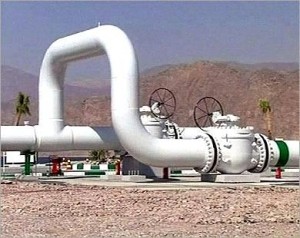 In the wake of the Egyptian uprising, everyone was telling Israel not to fear Egyptian democracy.
In the wake of the Egyptian uprising, everyone was telling Israel not to fear Egyptian democracy.
Israel was particularly concerned that a new government would tear up its 30 year treaty with Egypt which brought peace to Israel’s southern border and also provided a natural gas pipeline to supply a substantial percentage of Israel’s energy needs.
This same pipeline provides gas to Jordan, and both Israel and Jordan had negotiated preferential rates well below global prices.
Soon after the uprising the pipeline was blown up and gas supplies to Israel and Jordan halted.
The optimists said that this was some sort of reaction to the Mubarak government or the work of ‘Islamists’ and the pipeline would be restored.
It hasn’t.
Delaying tactics and excuses have now given way to a blatant cutting off of supplies.
The Elder of Ziyon reports :
An Egyptian source is quoted as saying that the Egyptians cannot resume pumping gas to Jordan and not to Israel without causing an international incident. Therefore they are preferring not to pump gas to Jordan altogether – just to hurt Israel!
This is somewhat contradicted by another statement the Elder reports:
Yesterday, a Jordanian official said that Egypt would be raising its price of gas to Jordan to be more in line with the going rate.
But they can’t sell to Jordan and not to Israel without causing a major international incident. Yet, is it really true that anyone would care about such an incident?
Yes, the United States would care, and their support, both financial and political, to the new regime and its putative successors would be at risk.
So the Egyptians just delay.
The point is really this: it would be politically unacceptable for the new regime to sell gas to Israel, despite the agreement and the fact that Israel has a part share in the consortium doing the pumping.
The Egyptian people did not just get rid of Mubarak because he was a dictator, but because he had continued the Sadat peace agreement with Israel, albeit rather half-heartedly.
This was known as the Cold Peace.
Well it’s now well below zero, folks.
Egyptians overwhelmingly hate Israel. Those who fuelled the uprising hate Israel. Any rapprochement, any deal, is unpopular and would cause more trouble.
All those who told Israel it should not fear democracy in Egypt may have to eat their words.
There is no democracy in Egypt, at least not yet. And when they do finally vote, I doubt any party will stand on an Israel-hugging platform.
Any cancelling of the peace treaty and the placing of Egyptian troops in Sinai could be catastrophic for the region, and especially Israel.
This will be a play-off between the power and influence – and money – of the United States and the anti-Israel, and often antisemitic, rhetoric of Egyptian politics and public discourse.
Is it not sad to observe that Egypt’s best chance for a true democracy and prosperity would be full political, cultural technological and economic relations with Israel. That would build a better future for all Egyptians.
Let’s hope my analysis is very wrong. Time will tell.
I did take time to look at a survey here taken last month which appears to show that I am wrong.
In this survey, taken by phoning people at random in Cairo and Alexandria by the Pechter Group, 37% of respondents supported the peace treaty with Israel and 22% opposed. Furthermore, the Muslim Brotherhood and Hamas did not have a lot of support.
Another survey reorted in the Huffington Post revealed:
On Israel and Palestinians: 69% said that of all Obama policies they were most disappointed toward Israel and Palestine; 90% named Israel as one of two nations that are the greatest threat to them and Egyptians were split as to whether there would ever be lasting peace between Israel and Palestinians.
Perhaps more revealing was this:
On Iran: 86% say Iran has a right to pursue its nuclear program, 56% agree Iran is trying to develop nuclear weapons and 79% say it would be positive if Iran acquired nuclear arms.
The problem is, however, that unless a strong democracy can be created, extremists will find a way to attack the treaty with Israel. Clamping down on these elements could be seen as regressive and unpopular.
The support for Iran’s nuclear programme is worrying.
It doesn’t exactly paint the pretty picture that the Western media is so keen to portray.